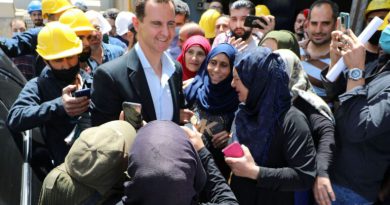In Syria rebel stronghold, building makeshift ventilators to fight virus
Iblib (Reuters) – A team of volunteers in Syria have cobbled together prototypes of a ventilator and a testing machine – homemade equipment to fight the new coronavirus if it hits the last rebel stronghold, where hospitals lie in ruins after nine years of war.
The group of 12, mainly technicians and engineers, hope to build hundreds of makeshift machines to combat the pandemic in Syria’s northwest, where an army advance made nearly 1 million people homeless this year.
“If coronavirus cases start to surface here, it will spread widely,” said Ayoub Abdul-Karim, a 20-year-old graduate who specialized in medical equipment. “We’re working on this today because there won’t be enough machines. We suffer in the hospitals from a big lack of ventilators.”
His homemade ventilator is assembled inside a brown wooden box, with white plastic hoses sticking out to help the patient breathe.
Doctors worry that people in overcrowded camps would be impossible to protect if an outbreak hits the area. The region, home to 3 million people many of whom fled other parts of Syria, has no confirmed cases so far, but little testing has been done. There is only one machine to run a polymerase chain reaction (PCR) test to detect the virus.
The volunteers have so far tried out their prototype ventilator at a hospital and have the green light from local doctors. They hope to get funding or equipment from aid agencies in the northwest and across the border in Turkey to produce hundreds of the breathing machines – critical to keeping COVID-19 patients alive.
While the virus has forced the world’s big cities into lockdown, Syrians crammed in refugee camps and makeshift settlements face grave risks. Clean water is often scarce, illnesses are rife and social distancing is nearly impossible.
“There are very few ventilators, much less than the need if the coronavirus spreads, and this had us very worried,” said Yamen Abu al-Walid, 37, who helped set up the team to bring together expertise and try to meet the region’s needs.
“The infrastructure is destroyed. We risk having many deaths if the disease strikes if there’s no preparation.”



